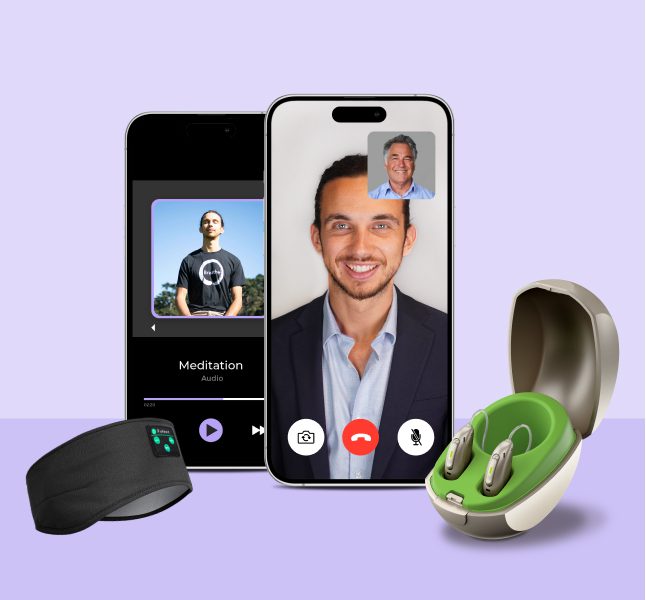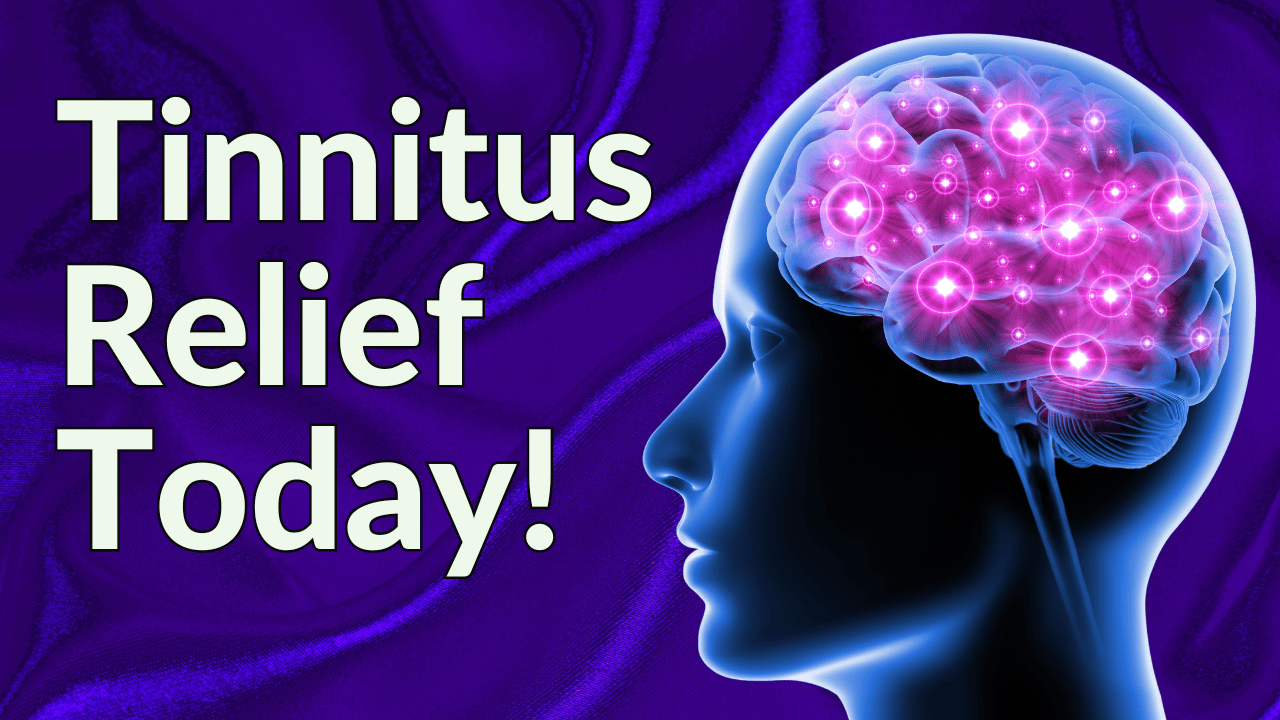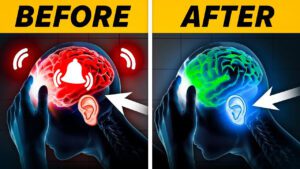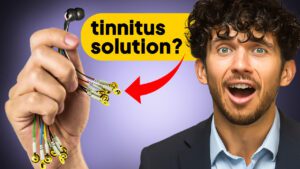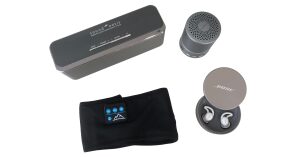Looking for a tinnitus cure? In today’s comprehensive article, you will learn about the newest research in search of a cure for tinnitus.
Before we get started, we want to highlight that the best treatment option that is currently available for tinnitus is a combination of sound therapy and cognitive behavioral-style support, and the audiologists at Treble Health are the nation’s leading tinnitus treatment experts.
There have been many important tinnitus research discoveries in 2022 and 2023 for potential tinnitus cures and treatments. Tinnitus can be such a difficult condition to live with, but there is hope as many groups work tirelessly on a cure from different angles. This includes genetic findings, wearable devices, and medical treatments like ear medicines and hair cell regrowth. Every one of the developments in this article is vital because it helps us discover what does and doesn’t work for tinnitus. Keep reading to see what is on the horizon for tinnitus.
Bimodal Stimulation
Michigan Tinnitus Device
This device was developed by Susan Shore, Ph.D. and a research team at the University of Michigan. It may be submitted for FDA consideration under the company name Auricle.
It is a device that uses auditory and somatosensory (certain types of senses) stimuli to the face and neck. This is in the form of headphones and electrodes. Bi-modal stimulation means two kinds of nervous system stimulation are done at the same time. Sound signals that match your tinnitus frequency are specifically timed and paired with small electrical pulses that activate nerves. These nerves are touch sensitive and are believed to affect tinnitus. The pulses are both to reset damaged nerves and suppress the neurons that cause tinnitus.
"Treble Health helped me reduce my tinnitus by about 80%, and now I can live my life again!"


"Treble Health helped me reduce my tinnitus by about 80%, and now I can live my life again!"
– Steve D.
Book a free consultation to learn which Treble Health solution is right for you. Join Steve and thousands more who have found lasting tinnitus relief.
Susan Shore said “the brain, and specifically the region of the brainstem called the dorsal cochlear nucleus, is the root of tinnitus.” Cells called fusiform cells become hyperactive, which causes the sensation known as tinnitus. The specific timing used in the Michigan Tinnitus Device is what helps turn off these overactive fusiform cells.
A research study done on this was performed using both humans and guinea pigs because guinea pigs have auditory systems very similar to ours. The survey results showed that the loudness of tinnitus decreased after the actual treatment. For some participants, the sound volume decreased by almost 12 dB, which resulted in a significant reduction in volume. Two of the patients said their tinnitus actually vanished. Patients also stated they had improved quality of life and none had any worsening symptoms or other negative effects.
Research has been going into this device for several years and it is promising. It may not work for all types of tinnitus, but shows hope for many. We hope to be able to share more information when it’s ready to try in the near future.
Treble Health Rating: Five Stars. Potential Breakthrough.
Lenire by Neuromod
Lenire employs the idea of bimodal stimulation similar to the Michigan Tinnitus Device. It uses what looks like the original iPod and over-ear headphones. However, their second form of nerve stimulation is a small device for use on the tongue.
It is a light feeling, however, similar to the candy that gently crackles when placed on your tongue. The tongue part of the device stimulates the trigeminal nerve. This is a nerve that provides numerous sensations for the face and mouth.
The Lenire can also be used at home. Its recommended use is 30-60 minutes daily for at least 12 weeks. Neuromod is an Irish company. As such, the device is on the market for public use in several European countries but is awaiting FDA approval in the US.
Their newest research study, released March 2022, showed that 70% of participants stated they benefited from using the Lenire, 87% of them would recommend the device to people they knew who suffered from tinnitus, and 50% had a clinically significant change on a specific tinnitus measurement scale, meaning a change large enough to be important. This device is not a tinnitus cure, but will likely be ultimately used in combination with other treatments for tinnitus.
Treble Health Rating: Four Stars. Promising.
Click here to join the Treble Health Lenire Waiting List for updates on the availability of this new tinnitus treatment.
The Leading Treatment for Tinnitus
Treble Health
The best treatment we have for tinnitus is what the team at Treble Health currently offers to patients in the United States. We combine sound therapy treatment and tinnitus coaching, using techniques based on cognitive behavioral principles. The Treble Maskers Bundle is a science-backed treatment for tinnitus that uses tinnitus maskers, personalized cognitive-behavioral-style coaching, mindfulness training, and sleep headphones.
An internal study conducted by Treble Health in 2022 followed 141 patients before and after their three month treatment. It used something called the Tinnitus Functional Index (TFI), a questionnaire to measure the impact of chronic tinnitus in people. A clinically significant reduction in the TFI would be 13 points. This study showed an average reduction of 22 points. This is two times larger than the amount needed to be a significant change. In the Treble Health study, 80% of patients had a clinically significant reduction in tinnitus.
Sound therapy treatment is done using tinnitus maskers and sound machines. You’re able to listen to sounds such as white noise (all the different frequencies of sound played at once), pink noise (a milder version of white noise), natural water sounds, crickets, and other soothing sounds. You generally will listen to these for most hours of the day for the best help. The closest thing we have to a cure for tinnitus is tinnitus maskers. At Treble Health, we specialize in remote tinnitus care and tinnitus maskers.
Tinnitus coaching can be done every one to two weeks and often you will be given daily or weekly practice to do on your own at home. Tinnitus coaching for tinnitus, using cognitive behavioral techniques, may focus on education and counseling for tinnitus. This includes masking options (sound therapy, music, fan noise, etc.), strategies for distraction, and information about therapeutic options. It may also encourage people to avoid catastrophizing thoughts about tinnitus. This includes the idea that tinnitus is not dangerous and that most people become used to tinnitus. Tinnitus is not the problem, but our reactions to tinnitus may be.
Treble Health Rating: Five Stars. The best treatment in lieu of a cure for tinnitus.
Hair Cell Regeneration
Hair Cell Regeneration with FX-322
Frequency Therapeutics is an MIT spinout. They are aiming to reverse hearing loss not with the existing technology of implants or hearing aids, but by regenerating tiny hair cells in the ear. These cells are part of what allow us to hear. This treatment for hearing loss can also be seen as a potential treatment for tinnitus, as the two are closely related. They have studies published in reputable scientific journals showing some early promise about how their FX-322 injection works.
The main condition in which people have hearing loss is called sensorineural hearing loss (SNHL), which affects over 90% of all people who have hearing loss. This happens when hair cells in the inner ear are damaged. They are unable to regrow themselves naturally. This leads to hearing loss.
FX-322 proposes to repair these tiny hairs by drug injections into the ear. There are no FDA-approved treatments to repair these cells as of yet. Studies done so far show mixed results in patients who received the FX-322 dose. Studies in the future need to be expanded to more patients to see if this drug will show significant improvement in those who have tinnitus.
Treble Health Rating: Three Stars. Too early to tell.
Injections In The Ear
OTO-313
OTO-313 was a potential ear injection treatment by Otonomy that now has been shown to not work. An August 2022 press release showed that it had no meaningful effect on any measured points. The company is stopping the development of OTO-313 entirely.
Its Phase 2 trial had 153 patients with persistent moderate to severe tinnitus. They were given either a placebo (fake) injection or an injection of OTO-313. The Phase 2 trial showed that the group who didn’t receive the treatment had higher results than in the previous study. This means that there was no significant correlation between the actual drug injection and any improvements. This is not a possible cure for tinnitus.
They are shifting focus to their OTO-413 injection studies for the treatment of hearing loss. It had Phase 2a results in April 2022 showing continued promising outcomes. Otonomy believes targeted medicine for the cochlea is key for the future of ear-related conditions. They created a way to keep injected medicines in the inner ear for longer than drugs can usually stay on their own. This means longer-lasting medication release and fewer amounts of injections needed.
Treble Health Rating: One Star. Failed.
Methylprednisolone Sodium Succinate Plus Lidocaine Injection
A 2022 study used an injection to an artery near the ear to treat tinnitus.
It studied 80 patients with persistent ringing in the ears. All were given Ginkgo Biloba and Vitamin B12 tablets. Half the group was given lidocaine-only injections and the other half were given lidocaine along with the drug methylprednisolone sodium succinate (a type of corticosteroid anti-inflammatory). This went on for 10 days.
The results were encouraging. An index measurement for tinnitus, Tinnitus Handicap Inventory (THI), was used to measure the results. While both groups had a decline in tinnitus symptoms and improvement in sleep quality, the group with the full dose of medicines had a greater decrease in symptoms. This means that lidocaine, Ginkgo Biloba, Vitamin B12, and methylprednisolone sodium succinate may work together to reduce tinnitus symptoms.
There were also no side effects aside from slight swelling where the injection went in. The result showed promise with no negative side effects. This means that with further study, the treatment could one day be used for tinnitus patients. Improving sleep quality in patients with tinnitus may be a key benefit from this approach.
Treble Health Rating: Two Stars. Unlikely to do much or be a cure for tinnitus.
Acoustic Neuromodulation
AUREX-3
The Aurex-3 is a wearable headset that uses sound to counteract tinnitus. It uses the idea of beat harmonics to tune a sound that complements your tinnitus and applies it (painlessly) to the outside of your head, where it is transferred via bone conduction to your inner ear. It is controlled with the Aurex app. This experimental new method will use telehealth, so you and your audiologist can control your treatment remotely from anywhere.
The goal of the Aurex-3 is to essentially rewire the brain’s patterns to calm tinnitus. It requires regular use. It is believed to neutralize or calm down cells that are being erroneously stimulated and creating tinnitus sounds. It works by transmitting vibrations that go and excite these nerve cells. This then returns them to a normal state and silence is achieved.
It has a high range of frequencies available to play, from 200 to 20,000 Hz. Our speech is mainly between 500 and 2,000 Hz, while sounds above 5,000 Hz sound very high-pitched. This wide range can comfortably cover any sounds tinnitus patients may be hearing. It requires more frequent use at the beginning and then the use can become less frequent, which suggests that this method may be more of a maintenance treatment.
Treble Health Rating: Two Stars. Unlikely to do much.
Tinniwell
Tinniwell is a tinnitus therapy treatment that uses warmth and filtered music. This can be done at home without requiring a doctor’s visit or assistance. It is basically an MP3 player and headphones. The player plays frequency-filtered music. The in-ear headphones are heated in order to use heat therapy to treat tinnitus. One cause of tinnitus is constricted (narrowed) blood vessels, which means that heat can be used for the outer and middle ear to promote blood circulation.
These headphones also help stimulate the vagus nerve. The vagus nerve is the longest cranial nerve and the main nerve of our parasympathetic system. This is the part of our nervous system responsible for rest and digestion, while the sympathetic nervous system is what controls our fight-or-flight response. The vagus nerve in particular controls our digestion, immune system, mood, and heart rate. Part of the vagus nerve is in the outer ear, which means that the in-ear headphones reach it and the heat can produce a relaxing effect.
The musical component works by first identifying the exact pitch of your tinnitus using the device. It takes only a few minutes. Next, you listen to special music that has removed the frequency of your tinnitus. You can then select from different modulations that sound most comfortable to you. Tinniwell recommends using the device for a minimum of 30 minutes a day. It is, however, still undergoing FDA approval. Its approval process was paused because of Covid-19.
Treble Health Rating: Two Stars. Unlikely to do much.
Other Tinnitus Research For A Cure
Electrical and Magnetic Stimulation of the Ear
A June 2022 study used electrical stimulation of the ear and showed a 79% improvement rate in tinnitus symptoms. There were no negative side effects. The treatment was non-invasive, meaning no surgery was required.
The team at the Polish university used a prototype device that gave both electrical and magnetic stimulation. It was non-invasive, with the electrode being placed in the external ear canal. While studies have been done on electrical stimulation of the ear for tinnitus since the 1970s, this treatment had changes that appear to work well.
The study followed 100 patients who had tinnitus. They got 5-minute stimulations with the device 10 times a day for five days a week. While each patient had persistent tinnitus pre-treatment, only 50 people had persistent tinnitus after the treatment. Some who had persistent tinnitus changed to only periodic tinnitus while 34 people had no tinnitus at all after the treatment. These numbers remained the same or better a whole 3 months after treatment concluded. Needless to say, this could be a great help to tinnitus sufferers if the results work in further studies.
Treble Health Rating: Three Stars. Too early to tell.
Genetic Components of Tinnitus
Research has found a possible genetic link to severe tinnitus. It is still an early field for tinnitus-specific research among our genes, but there is growing evidence of a genetic connection. Scientists used to think there were only 300 genes related to critical proteins in the hearing system but now believe there are around 1000 genes. As you can see, the field has changed dramatically in recent years.
This research can mean a shift in the community from seeing tinnitus as only a symptom of a larger disorder to being seen as an actual neurological disorder, now called tinnitus disorder. Typically tinnitus has been thought of as caused by environmental factors.
A 2020 study that used data from 433,827 participants showed that the link between hearing loss and tinnitus was bi-directional. This means that hearing loss can cause tinnitus and tinnitus can also cause hearing loss. It also found genetic links to tinnitus. Previous studies showed no genetic link with tinnitus, but this could be due to study design creating false-negative results.
The good news is that while more research needs to be done, the cost and time associated with genetic research have never been lower. More tinnitus research results could be out faster than you think.
Treble Health Rating: Two Stars. Unlikely to result in a tinnitus cure.
Extracochlear Multichannel Electrical Stimulation (EES) to Relieve Tinnitus
Another study done in June 2022 at a university in Shanghai, China offers a completely new kind of potential treatment. This team used extracochlear electrical stimulation to attempt to relieve tinnitus in guinea pigs who did not have a hearing impairment. It also wanted to study if tinnitus could be relieved by auditory-somatosensory neuroplasticity changes, or essentially rewiring the brain by using hearing and sensory information. This is similar to the Michigan Tinnitus Device but different in several regards.
The study used a four-electrode implant on the outside of the ear that would stimulate the cochlea, the part of the inner ear that turns sound vibrations into signals your brain can read. Results showed that the EES did significantly decrease multiple measurements of tinnitus in guinea pigs. It changed the misfiring auditory-somatosensory system without affecting hearing or the tiny hair cells in the inner ear. This technology could be useful in the future if proven to work as well in additional studies.
Treble Health Rating: Three Stars. Too early to tell. It has not yet been tested on humans.
Can Tinnitus Be Cured?
As shown in this blog post, there are many cutting-edge research teams dedicating themselves to finding out what works best to treat tinnitus. From wearable devices to injections to new genetic discoveries, tinnitus research has changed greatly in the last decade and the last few years. We believe that tinnitus can be cured; however, it will take many more years until we reach that possibility. If any of the research mentioned in this article continues to show promise, it will be a good amount of time before it hits the market in the United States.
In the meantime, Treble Health offers the leading treatment for tinnitus. Don’t wait for a cure and miss out on improvements that you could see this year with evidence-based tinnitus treatment. To get started with a complimentary telehealth consultation, click here. This no-strings-attached, 20-minute Zoom call is a great opportunity to have all of your questions answered and explore the various treatment options suited to your individual situation. Remember that tinnitus relief is within reach, and our team is here to guide you along your journey to habituation.
Next Step: Book Free Consultation
- 75% of patients reduced their tinnitus within three months after following our recommendations.
- "I feel like Treble Health literally gave me my life back." - Randy S. (verified customer)
- Join thousands of people who have reduced their tinnitus after scheduling a free consultation.








